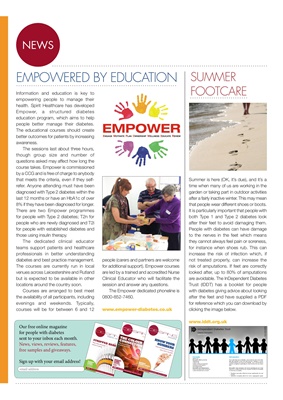
NEWS
As reported by Reuters, tiny Israeli
drugmaker Oramed Pharmaceuticals Inc,
has said that its experimental oral insulin
succeeded in significantly reducing nighttime blood glucose in patients with Type
2 diabetes, according to initial data from
a midstage trial.
The result is likely to surprise many
sceptics who did not believe insulin could
be delivered orally because they doubted
it could survive the onslaught of digestive
juices so it could have the intended effect.
Oramed uses a protective coating and a
high-enough dose of insulin so that most
of it can be destroyed and still deliver a
clinically beneficial amount
The positive results must be replicated
in a larger Phase III trial before the drug,
known as ORMD-0801, can be submitted
for approval. But the data from the
Phase II, 180-patient trial represents a
SIBLINGS NEEDED FOR STUDY
The adAPT Trial is a family study looking at the possibility of preventing
the onset of Type 1 diabetes through an inexpensive drug treatment
regime. The researchers are looking to recruit brothers and sisters
aged between 5 and 16 years old with a sibling who developed Type
1 diabetes when they were under the age of 25. They would also
like to involve the offspring aged between 5 and 16 years of a parent
who developed Type 1 diabetes when they were under the age of 25.
The trial is launching in Scotland with a second site due to be started
shortly in Newcastle. www.adaptdiabetes.org
ORAL INSULIN STILL POSSIBLE
major milestone. While insulin is typically
associated with Type 1 diabetes, many
patients with Type 2 eventually see their
disease progress to the point where they
need insulin. Type 2 accounts for more
than 90% of the nearly 400 million people
with diabetes worldwide.
A safe and effective oral insulin, if
approved, is expected to become a
multibillion-dollar product. The main
attraction of an insulin pill, aside from
avoiding injections, is that it comes much
closer to the path of natural insulin, which
is produced in the pancreas and goes
directly to the liver. ORMD-0801 goes
from the gut to the liver, while injected
insulin circulates throughout the body
before it gets there.
Image shows Oramed MD Nadav
Kidron holding the experimental pill.
As written by Jacinta Bowler for Science
Alert: "Type 1 diabetes isn't an easy
disease to put an end to; not only do
scientists have to fix the complete lack
of insulin being produced by the patient's
own pancreas, but the cells they try to
send in to help keep getting destroyed
by the immune system. It's a medical
catch-22. But a US patent has just been
approved for what could be the first
functional cure for the condition - by
combining insulin-delivering cells with
technology that allows them to hide from
the immune system for years at a time.
The cells are called 'Melligen cells', and
they can produce, store and release
insulin in response to blood sugar levels.
"University of Technology Sydney
(UTS) scientists have been genetically
engineering these Melligen cells for years
so they can release insulin in order to
regulate human blood sugar levels - just
like the beta cells that are destroyed by
type 1 diabetes are supposed to.
'"If we are successful in this effort,
it will bring to fruition the many years of
research that have been conducted by
Professor Simpson and her colleagues
at UTS in developing these remarkable
cells," said PharmaCyte's CEO Kenneth
Waggoner. "For the millions of people
worldwide who suffer from a disease
of epidemic proportions, our treatment
could relieve them of the onerous daily
requirements for insulin administration and
dietary restrictions and offer a life free from
the very serious and even life-threatening
complications associated with diabetes."
http://bit.ly/melligen_cells
PATENT FOR
POSSIBLE
TYPE 1 CURE